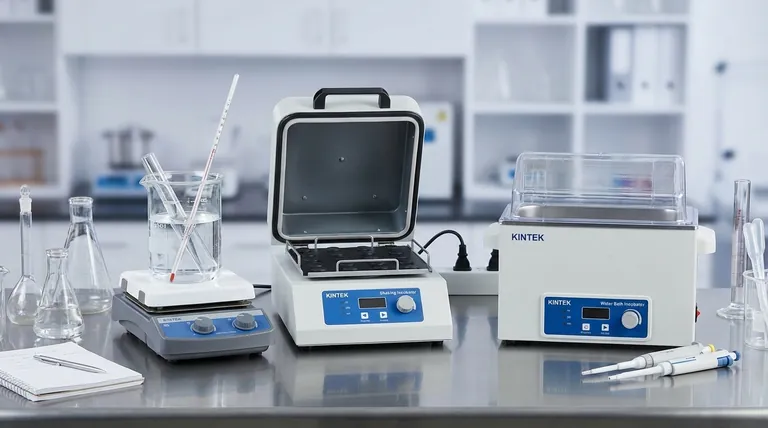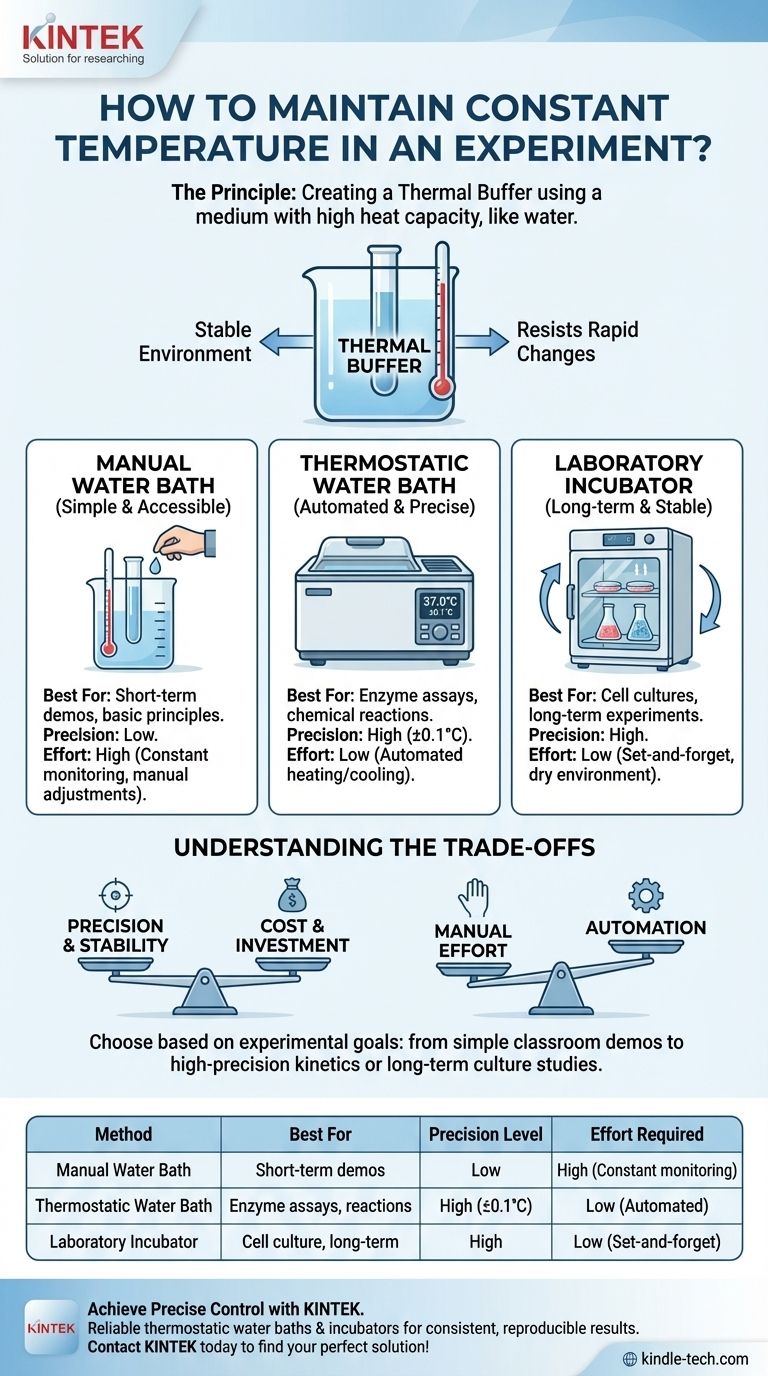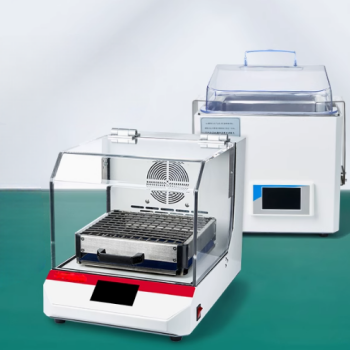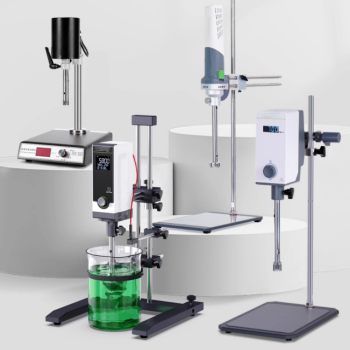To maintain a constant temperature in an experiment, the most common and accessible method is to use a water bath. This involves placing your experimental container, such as a test tube, inside a larger beaker filled with water at the desired temperature. The water acts as a thermal buffer, slowing down temperature changes and allowing you to make manual adjustments by adding small amounts of hot or cold water as needed.
The key to maintaining a constant temperature is to use a medium with high heat capacity, like water, to create a stable thermal environment. The best method—from a simple beaker to an automated incubator—depends entirely on the level of precision and stability your experiment requires.

The Principle: Creating a Thermal Buffer
A stable temperature is non-negotiable for reproducible scientific results. Whether you are studying enzyme activity, cell cultures, or chemical reaction rates, even minor fluctuations can invalidate your findings. The core strategy is to create a controlled thermal environment that resists change.
Why a Water Bath is Effective
Water has a high specific heat capacity. This means it can absorb a large amount of heat energy before its own temperature significantly increases.
This property makes water an excellent thermal buffer. It effectively shields your experiment from rapid temperature swings in the surrounding air, creating a much more stable environment.
Setting Up a Simple Manual Water Bath
To start, fill a beaker with water that is at your target temperature. Place your experimental sample, contained within a smaller vessel like a test tube, into the water.
You must monitor the temperature constantly with a thermometer. As the water cools, you will need to manually add small amounts of hot water to bring it back to the target temperature, stirring gently to ensure even distribution of heat.
Moving Beyond Manual Control
While simple, a manual water bath is labor-intensive and lacks precision. For experiments that are long or require very tight temperature control, you need more advanced equipment.
The Thermostatic Water Bath
A thermostatic water bath is an automated version of the manual method. It contains a heating element, a temperature sensor, and a controller.
You simply set the desired temperature, and the device will automatically turn the heater on and off to maintain that temperature with a high degree of accuracy. This is a standard piece of equipment in most biological and chemical labs.
The Laboratory Incubator
An incubator is essentially a temperature-controlled oven that provides a dry, stable thermal environment. It's ideal for long-term experiments, such as growing bacterial cultures on petri dishes or incubating cell culture flasks.
Unlike a water bath, which uses direct contact with water, an incubator controls the temperature of the air circulating within an insulated chamber.
Understanding the Trade-offs
Choosing the right method requires balancing precision, cost, and convenience. There is no single "best" solution for every scenario.
Precision vs. Cost
A beaker and a kettle are extremely cheap but offer low precision. This method is prone to human error and temperature gradients.
A professional thermostatic water bath or incubator provides very high precision (often within ±0.1°C), but represents a significant financial investment.
Manual Effort vs. Automation
The manual water bath requires constant monitoring and adjustment. It is not practical for experiments that run for more than a few minutes.
Automated systems like incubators allow for "set it and forget it" operation, freeing you to perform other tasks and ensuring perfect consistency for experiments that can last for hours or even days.
Making the Right Choice for Your Experiment
Your experimental goal dictates the necessary level of control.
- If your primary focus is a simple classroom demonstration: A manual water bath is perfectly adequate to illustrate a principle over a short period.
- If your primary focus is an enzyme kinetics assay: A thermostatic water bath is essential for the high precision required to get reliable rate data.
- If your primary focus is growing cell or bacterial cultures: A laboratory incubator is the only suitable choice for providing long-term, sterile, and stable conditions.
Ultimately, selecting the correct tool for temperature control is the first step toward reliable and meaningful experimental results.
Summary Table:
| Method | Best For | Precision Level | Effort Required |
|---|---|---|---|
| Manual Water Bath | Short-term demos, basic principles | Low | High (Constant monitoring) |
| Thermostatic Water Bath | Enzyme assays, chemical reactions | High (±0.1°C) | Low (Automated) |
| Laboratory Incubator | Cell culture, long-term experiments | High | Low (Set-and-forget) |
Achieve precise and stable temperature control for your experiments with KINTEK.
Whether you need a reliable thermostatic water bath for enzymatic assays or an incubator for long-term cell culture studies, KINTEK's high-quality lab equipment ensures your experiments run with the accuracy and consistency required for valid, reproducible results. Our products are designed to meet the specific needs of laboratories, providing the reliable thermal management you need to focus on your research.
Contact KINTEK today to find the perfect temperature control solution for your lab!
Visual Guide

Related Products
- Shaking Incubators for Diverse Laboratory Applications
- 1700℃ Controlled Atmosphere Furnace Nitrogen Inert Atmosphere Furnace
- 1400℃ Laboratory High Temperature Tube Furnace with Alumina Tube
- 1400℃ Controlled Atmosphere Furnace with Nitrogen and Inert Atmosphere
- 1700℃ Laboratory High Temperature Tube Furnace with Alumina Tube
People Also Ask
- What critical reaction conditions does a shaking incubator provide? Optimize Cassava Cellulose Enzymatic Hydrolysis
- What role does a laboratory constant temperature shaker play in the fungal strain cultivation stage? Boost Mycelium Growth
- Why is a thermostatic shaker required for SSF of rice husk solids? Maximize Your Ethanol Yield with Precision Agitation
- What is the importance of a constant temperature shaking incubator? Ensure Precise Bacterial Growth and Membrane Tests
- Why is a constant temperature shaker required during the impregnation of manganese salts onto activated carbon?



















